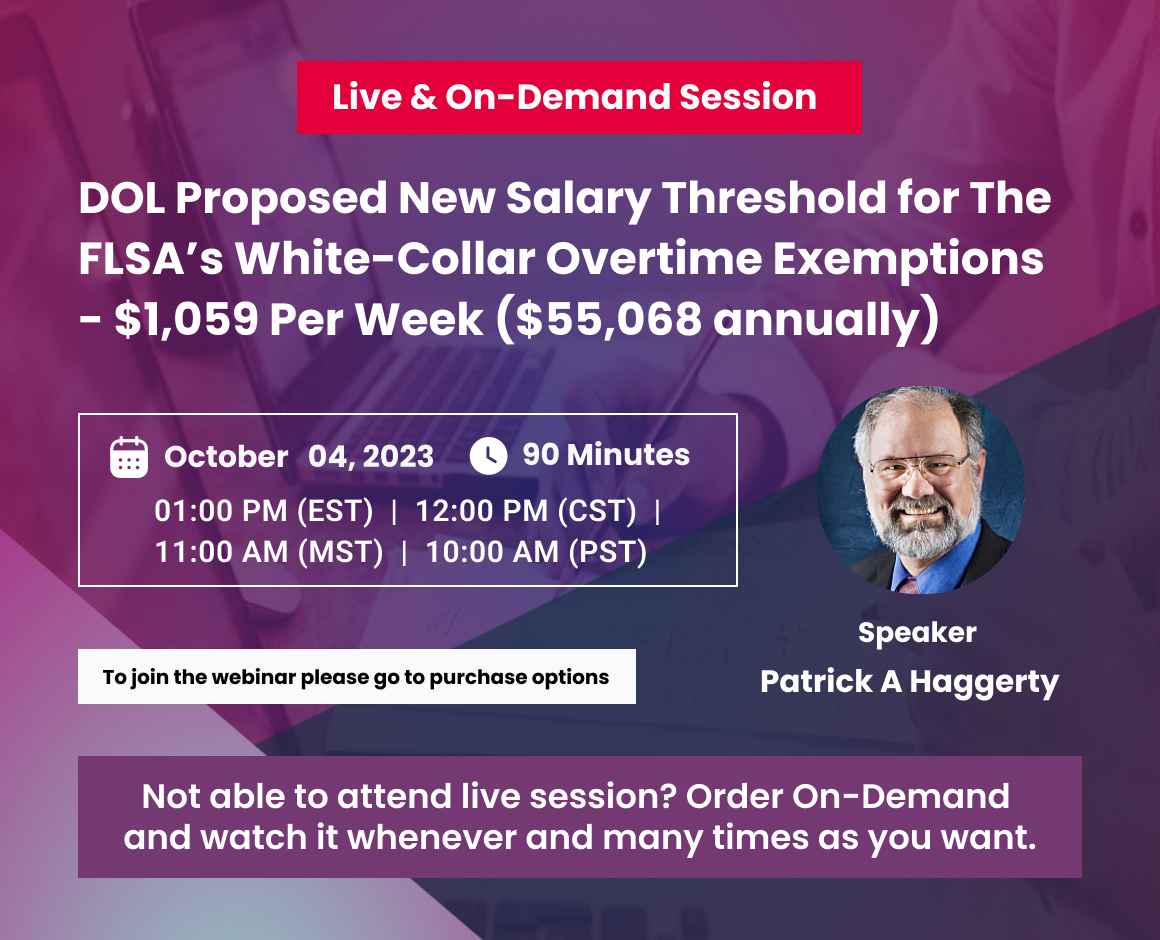Overview
The Department of Labor has released proposed new rules for exempt employees. If finalized, the new rules will increase the minimum salary thresholds for exempt employees and provide an automatic updating mechanism for the thresholds to reflect current earnings data. The proposed minimum salary threshold for most exempt employees is $1,059 per week, which is $55,068 for a full-year worker.
Description
This session will describe the proposed changes and compare them to the current Department of Labor regulations as they apply to the white-collar exemptions to the minimum wage and overtime requirement of the Fair Labor Standards Act (FLSA). The tests for exemption are the salary basis test, minimum salary requirement, and duties tests. These tests have changed over the years and are complex and can be confusing. In addition, there are strict record-keeping requirements and salary integrity requirements to prevent disqualification of the exemption. The webinar will also describe proposed changes to the rules and how employers can prepare for the changes.
Both the federal Department of Labor and State Wage and Hour agencies are engaged in enforcement initiatives concerned with the misclassification of employees as exempt from the Fair Labor Standards Act overtime requirements. Employers are often confused as to which exemptions may apply to a particular employee.
Why attend
Making sure that employees are properly classified as exempt or non-exempt can be a daunting task. Misclassification of employees as exempt can be costly in terms of penalties and back pay awards for overtime compensation. This session will discuss the ways that employers can stay compliant as well as some of the ways employers have found themselves in trouble.
In addition to information regarding the newly proposed rules for exempt employees, you will learn how to determine whether an employee qualifies for exemption from the FLSA minimum wage and overtime requirements. How to handle certain employee absences from work, including FLSA intermittent leave, use of paid time off for part-day absences, and employer actions that can lead to disqualification.
After attending this session, you should be able to:
- Use the proposed thresholds to assess the potential impact on employee compensation
- Compensation alternatives for employees who may no longer meet the threshold
- Distinguish between the various types of exemptions.
- Identify whether specific work activities support exempt status or nonexempt status
- Know the common misconceptions about exempt status, job titles, and salary basis
- Understand the proper application of the federal salary basis test.
- Identify employer actions that defeat the exemption
- Identify exceptions to the salary basis rules
- Explain why time records for exempt employees matter
Areas Covered
- The executive, administrative, professional, and selected other exemptions
- The requirements for exemption: the salary basis, salary amount, and duties tests
- The differences in the various types of exemptions.
- Work activities that support exempt status and those that indicate nonexempt status
- Common misconceptions about exempt status, job titles, and salary basis
- Proper application of the federal salary basis test.
- Employer actions that defeat the exemption
- Exceptions to the salary basis and salary amount rules
- Why time records matter
- Treatment of certain employee absences from work such as FLSA intermittent leave and use of paid time off for part-day absences
- Employer actions that can lead to exemption disqualification.
- Planning for the change – alternatives for employees who do not meet the salary threshold.
Who should attend
- Payroll Supervisors and Personnel
- Payroll Consultants and Service Providers
- Public Accountants and Enrolled Agents
- Internal Auditors
- Employee Benefits Administrators
- Officers and Managers with Payroll or Tax Compliance Oversight
- Company / Business Owners
- Managers/ Supervisors
- Public Agency Managers
- Audit and Compliance Personnel / Risk Managers
Ask your question directly from our expert during the Q&A session following the live event.

